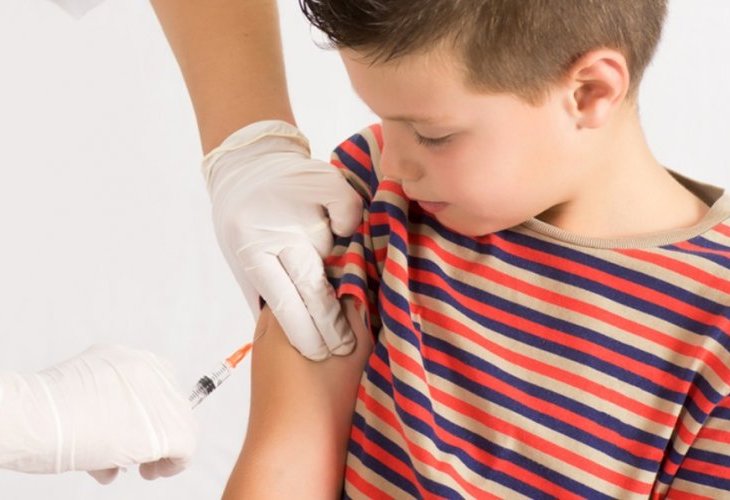Flu Vaccinations in Schools: Only 60% of Students Agreed to Get Vaccinated
Flu vaccinations can save lives, especially for children and high-risk groups. The Committee for Children's Rights discussed the issue and highlighted the importance of the vaccine.
 (Photo: shutterstock)
(Photo: shutterstock)The Committee for Children's Rights held a discussion on "Vaccinating Children Against Flu," during which the parties discussed vaccination rates in Israel and the implications of the findings.
Committee Chairperson, MK Yifat Shasha-Biton (Kulanu), opened the discussion: "We usually talk about the flu as a winter illness, but we do not always give it the high importance it requires, especially when many people die from the flu worldwide. In places where prevention can be achieved, it must be done, especially when we are talking about children at high risk. That's why we are here today."
The Ministry of Health presented that contrary to the common perception of flu as the most common respiratory infectious disease in the developed world during the winter months, it leads to severe illness and mortality across Western countries. Dr. Emilia Anis stated, "In an average season, about a third of children and a fifth of adults get infected with the flu virus," and in the U.S., about 100 children die from the flu every year.
During the discussion, it was presented that after assessing the issue in recent years and following the conduct of Western authorities, the Ministry of Health decided to introduce flu vaccinations in schools with the aim to vaccinate as many children as possible. This year, the vaccination was introduced to second graders, and the ministry plans to expand the program to one age group each year to include all classes up to fifth grade.
During the discussion, representatives from the Ministry of Health presented a summary document on vaccinating children in schools. According to the data presented, service providers in schools have managed to reach 55% of students thus far. Among the children reached for vaccination, the response rate was 60.4%.
They also presented that the main reasons for not providing the vaccine were primarily parental refusal - 90%, and other reasons included student refusal - 3.4% and absence on the vaccination day - 3.5%.
The Ministry of Health noted that they closely monitor any adverse events that occur in proximity to receiving a vaccine, and since 2010, 8.7 million flu vaccine doses have been administered in Israel. During this period, there have been no severe events causally linked to the flu vaccine. "In those years, we estimate that the flu vaccine has prevented hundreds of flu deaths each year," noted the ministry.
Ministry of Health representative Dr. Emilia Anis: "Children die from the flu every year. We in the ministry are making efforts to vaccinate children and women before childbirth. For those children not included in the school vaccination program, we offer incentives to clinics. 1.6 million people, including over 180,000 children under 5, were vaccinated by the end of November, about 20% of the target population. All these were vaccinated in clinics. Our website provides educational materials. We also offer education among professionals, and campaigns have been carried out for years."
Dr. Hussein Dabbah, representative of the Pediatricians Association: "We have a problem with the perception of flu in the population. It is perceived as a mild illness, something you can drink chicken soup to recover from. But the disease can be deadly. If we internalize this, the trend will change. Ways to reach more students need to be found. This exists in the U.S. and the UK and works. There is no reason for us to lag behind. Next year, everyone should already be vaccinated, from grade 1 to 6. I don't see a reason to do this gradually. Doctors would be happy to contribute one day a year to vaccinate. Excuses of lack of manpower will always exist, but even medical interns can do it."
 (Photo: shutterstock)
(Photo: shutterstock)MK Shasha-Biton: "If we are all of one mind here, and yet there is not enough awareness, then perhaps something is ineffective in the education, which maybe doesn't exist at all or exists in a flawed and incorrect way. Therefore, the state and the clinics should organize to market the vaccine."
Nadav Peretz, representative of Maccabi Health Services: "We approach all target populations personally with letters, messages, in four languages, holding children's events to enjoy the added value and, of course, vaccinate. There is an immediate need for educational initiatives in schools."
Dr. Anis: "We provide education among professionals, in health funds. We've seen that campaigns are not effective."
Dorit Goldman, representative of Meuhedet Health Services: "We send text messages, emails, do marketing and advertising, we vaccinate everywhere, in every fund and every site of ours. Forty percent of our clients are Haredi and 20 percent Arabs. Among Arabs, I'm pleased to say that the vaccination rate is high, but not more than in Jewish society. Among the Haredi, it's harder to vaccinate. We use all the means at our disposal, even hanging posters in clinics signed by rabbis."
The representative added that "the vaccination rate among health system workers stands at 28 percent, 23 percent among doctors, and 47 percent among nurses. There should be encouragement for this."
The committee chairperson called for toddlers to be encouraged to get vaccinated when they arrive at Tipat Chalav. Dr. Anis replied that this is being examined. "It's too complex to vaccinate there; logistically, it adds more work to Tipat Chalav, which is already very busy. There is no problem referring the vaccine to a pediatrician."
MK Shasha-Biton: "I do not accept that if the child is already at Tipat Chalav, they will not receive another shot, at least refer them to it."
The committee chairperson summed up the discussion: "The perception is of preventive medicine. Influenza should be rebranded as a deadly disease, even in the Western world. It is important to start with the medical staff, if things are not happening there, then where will they happen? I welcome the decision to vaccinate in schools in Israel and would be pleased if the Ministry of Health expedited the process. It is very important to increase education. I think Tipat Chalav is an excellent framework to encourage parents to receive the vaccine and even receive the vaccine there. Often, tests are conducted in public places, thus increasing compliance, and this should also be pursued in this direction."

